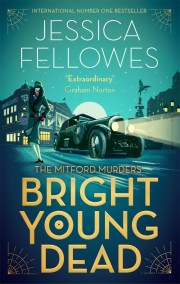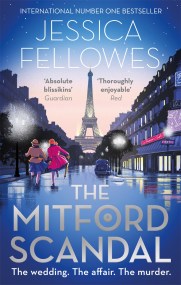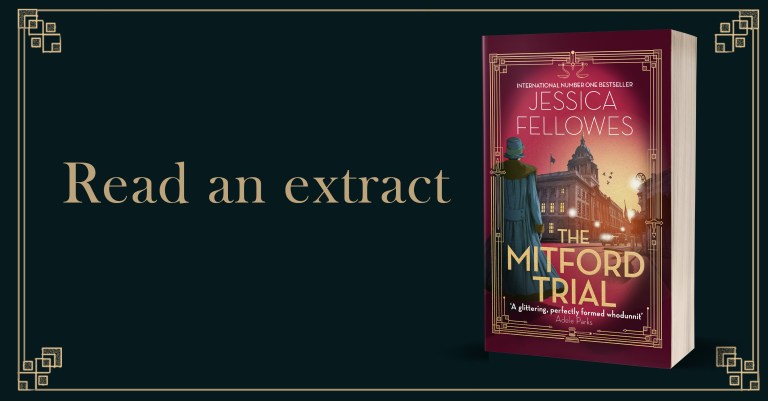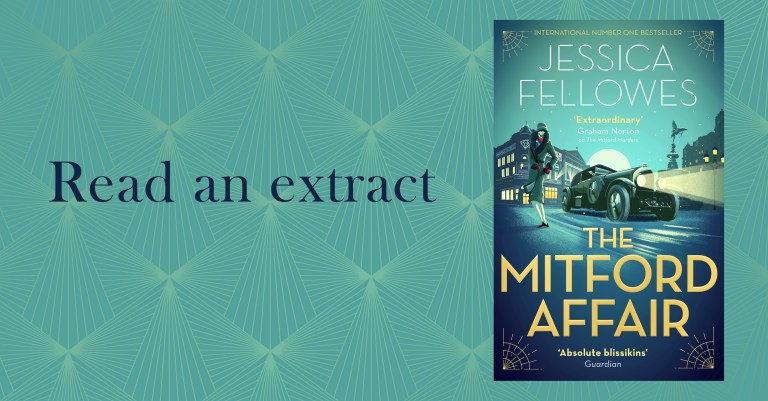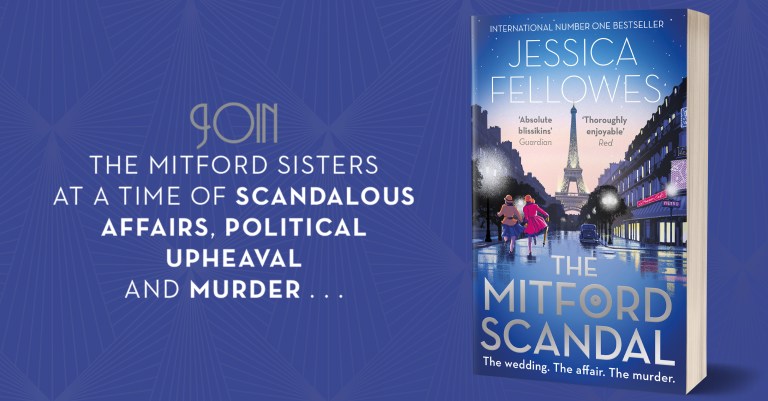Read an extract from The Mitford Murders by Jessica Fellowes
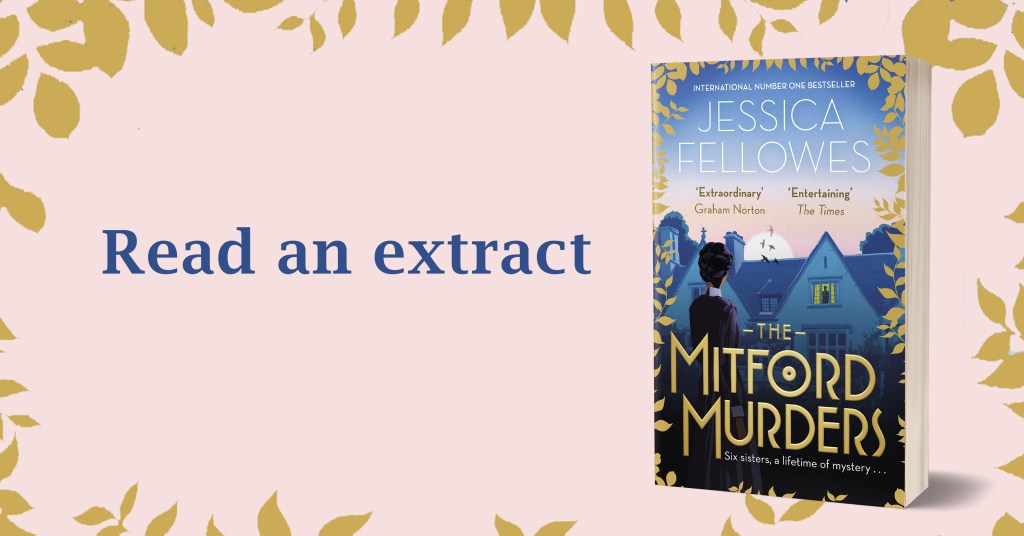
Ahead of the publication of The Mitford Trial, the fourth book in the thrilling Mitford Murders series by bestselling author Jessica Fellowes, we’ll be sharing extracts from the first three books in this brilliant series. Read on for an extract from the first, The Mitford Murders.
PROLOGUE
12 January 1920
Florence Shore arrived at Victoria station at 2.45 p.m. in a cab. It was an extravagance, all the way from Hammersmith, but one she felt she deserved. The style of arrival befitted her new fur coat, a birthday present to herself that she had worn for the first time only the day before to impress her aunt, Baroness Farina, over China tea and ginger thins, her aunt apologising for the lack of cake.
Florence had been at this station only twenty hours earlier, when she returned from the day trip to her relation in Tonbridge, and now she was heading back in almost the same direction, to St Leonards- on- Sea, where her good friend Rosa Peal lived above a teashop. Besides the birthday and the fur coat – reason enough for anyone to take a cab rather than the two buses it would take to cross the city – Florence was excused her choice of transport thanks to her substantial luggage: a dispatch box, a large suitcase, her vanity case, an umbrella and a handbag. Furthermore, on the question of reckless spending, it was only two months since she had been demobilised so she had spent few of the extravagances she might have allowed herself since inheriting money from her sister five years before. Not to mention she had her savings. That decided it, then – Florence hailed a porter. She would tip him handsomely, if he bore her cases without complaint.
‘To platform nine, please,’ she told him, ‘by the third- class carriages.’ Her self- indulgence had a limit.
Free from her loads, Florence adjusted her neat fur hat and shook out her long skirt. The pre- war fashions suited her figure better; she wished occasionally she could stand to lose the corset but she couldn’t get used to it. The one time she had walked out without her stays she had felt as if she were parading down the street naked. According to ritual, she patted her handbag, held on to her umbrella for walking support and marched with purpose to the ticket office. She did not have time to waste.
There was a post office in the station, and she wondered if she should send a note to the porter at her lodgings to let her know she had gone away, but decided against it. She could write from St Leonards, after all. She carried on towards the ticket office, relieved to see that there were no long queues, and stood behind an agreeable- looking young woman at stand number six. Florence admired the slim figure before her, glossy hair swept up and tucked into a large hat, trimmed with navy satin. The fashion for bobbed hair had not yet quite swept the capital in the way she had seen in Paris, though she suspected it wouldn’t be long. Speedily, the woman bought her ticket and, on completing her transaction, gave Florence a fleeting smile before going on her way.
Florence faced the ticket officer, a bearded man in a cap behind glass. She briefly wondered how the railway authorities permitted beards, then reminded herself that he could have facial disfigurements from the war that he wished to disguise. It was common enough, as she knew all too well.
‘Yes, ma’am?’ he prompted. ‘Where to?’
‘Third class to Warrior Square, St Leonards, please. Returning a week today.’
Florence saw him glance at her war medal and he gave her a look as if to say: You’re one of us. What he actually said was: ‘Platform nine. You’re in time for the three- twenty. It’s a fast train to Lewes, where it separates – front carriages to Brighton, rear carriages to Hastings. You want to sit in the back.’
‘Yes, I know,’ said Florence. ‘But thank you.’
‘Six shillings, then.’
She already had her bag on the ledge before her; the correct change was swiftly fetched from her purse. Deft, even in gloved fingers, Florence handed the money over and received in turn the small, stiff rectangles. Carefully, the return portion was secreted in the bag, the outward- bound ticket she kept in her hand, the clasp snapped shut.
Back out on the concourse, Florence looked up at the station clock – it was not yet on the hour but she knew the porter would be shivering on the platform with her bags, so she decided against a quick dash to the station’s cosy tea room for a cup of tea. The way before her felt vast and empty, more like an aeroplane hangar than a train station. The bleak chill of January had long killed the jollity of Christmas, let alone the novelty of a new decade. They’d looked forward to a post- war life for so long, only to find that nothing could be returned to the way it was before. Too much had changed; too much grieving had been done.
At least the journey ahead was not a long one and Rosa would be ready with a hearty supper when she arrived – generous slabs of bread and thickly spread butter, carved slices of honey- sweetened ham and a glass of ale, probably followed by a wedge of unsold cake from the teashop, warmed with a dollop of homemade custard. After a week or two at Rosa’s, Florence’s corset always had to be loosened by an inch. Strangely, recalling this feast – a memory that could be trusted after many visits to her friend – did not stir Florence’s appetite. Hot, sweet tea was all that she wanted right now, but no matter. She had had worse deprivations.
She continued her walk towards the train. Number nine was a sort of half- platform, running along the far right side of the station so that one had to walk through platform eight to get to it. As she moved along, stately but sure, like the Lusitania departing from Liverpool, she thought she recognised a figure out of the corner of her eye. It gave Florence a start. Did he know she would be at Victoria? The man was slight, angular and frayed at the edges – a wooden life raft to her ocean liner. His back was half- turned away and his hat was pulled down low so that she couldn’t be sure if he had seen her. Florence picked up the pace, her heart quickening. She spotted her porter up ahead, waiting patiently by her bags, and she calmed herself. She had only to get on the train; in less than twenty minutes she’d be on her way.
Florence caught the porter’s eye and held it as she approached him, unnerving him rather. It made her feel safer to look at him, even though he was nothing but a stripling. He scratched at his chin and nervously pulled at his cap. Something tugged in Florence’s mind at seeing his edginess. She was about to dismiss it when someone came into view, on the porter’s right: Mabel.
The boy made guttural noises. ‘Ma’am, sorry, ma’am, this lady wanted to take your luggage but I wasn’t sure . . . ’ He trailed off.
Mabel moved forwards. ‘Florence, dear. He wouldn’t take my tip.’
Florence did not reply but spoke directly to the porter. ‘That’s quite all right. You can go now. Thank you.’ She gave him a shilling with finality and he walked off, relief on his face. She turned to Mabel. ‘What are you doing here?’
‘That’s no way to greet your old friend, is it?’ said Mabel, smiling. ‘I just thought I’d help you. I know how particular you are about where to sit. And you have so much luggage, you couldn’t manage alone.’
‘I had a porter, as you can see. I can manage perfectly well.’
‘I know. But there’s no harm in accepting my help. Now, stay there, I’ll check the compartments.’
As they had been standing there the train had pulled in. With the porter dismissed, Florence stayed by her bags while Mabel opened the first of the third- class carriage doors and then the other.
She soon returned.
‘You’ll have to go in here. There’s no one else, so you can sit where you like. There’s a lady in the other one and she’s sitting facing the engine. She won’t move.’
Florence was silent, her features smoothed over, as hard to read as an ancient tombstone, the etchings barely visible after centuries of rain and wind. Mabel picked up the large suitcase and the dispatch box, dark red leather with faded, pale corners, battered after years of accompanying its owner around France. Florence had already picked up her vanity bag, small and navy blue, its key in her purse. It had been a present from her aunt, bought from Asprey in Bond Street when Queen Victoria was still on the throne.
The compartment Mabel had chosen was indeed empty of another soul, and had already been swept clean of the usual passenger detritus since its last journey. Two padded benches faced each other and there was only one other door, on the opposite side. Once the train was moving, nobody else would be able to get in. Mabel put the case under the first seat on the right- hand side, facing the engine. The dispatch box she put next to the space where Florence was to sit. Florence took off her hat and put it on the box beside her.
‘Have you got anything to read?’ Mabel asked, reaching forwards to look in Florence’s handbag but was warded off with a sharp movement. ‘You’d better sit down. You haven’t got long now.’
Florence still said nothing but sat down in the seat that Mabel had appointed for her. It was in the far corner; from the platform she couldn’t be seen easily by anyone looking in. It wasn’t yet dusk but the light was dull, the sky the same dirty marble as the concourse floor. Thankfully the steam pipes would warm her up before too long. There were gas lamps in the compartments but they wouldn’t be lit until Lewes. Reading in this light was not impossible but not particularly comfortable for a woman her age – fifty- five years old as of the day before. She had decided to retire when the war ended and now, she thought, she had only her old age to look forward to.
Mabel straightened up, looking as if she was about to say something, when there was a stirring behind her, causing her to jump. The door opened and a young man, of twenty- eight or perhaps thirty years old, stepped inside. He wore a light brown suit of tweed and a hat. Florence couldn’t see an overcoat, which one might have expected on someone travelling to the coast in January, but perhaps there was one slung over his arm and she just didn’t notice it. He had no luggage, no walking stick nor even an umbrella. He sat down on the left, by the window, diagonally across from
Florence, his back to the engine.
They heard the station guard’s whistle blow – the five- minute warning.
Mabel moved towards the door and the man stood up. ‘Let me,’ he said.
‘No, thank you,’ replied Mabel. ‘I can do it myself.’
She pulled the window down with the leather strap, leaned outside to turn the handle and pushed the door open. Florence remained seated and did not acknowledge her travelling companion; a newspaper lay on her lap, her reading glasses perched on her nose. Mabel stepped outside, pushed the door shut and stood on the platform looking in. It was not long before the guard blew his final whistle. The train moved off, slowly at first, then gathered momentum steadily until by the time it reached the first tunnel it was rolling down the line at full speed. That was the last time anyone saw Florence Nightingale Shore alive again.
'A lively, well-written, entertaining whodunit' THE TIMES
Lose yourself in the sumptuous first novel in a new series of Golden Age mysteries set amid the lives of the glamorous Mitford sisters.
It's 1919, and Louisa Cannon dreams of escaping her life of poverty in London, and most of all her oppressive and dangerous uncle.
Louisa's salvation is a position within the Mitford household at Asthall Manor, in the Oxfordshire countryside. There she will become nurserymaid, chaperone and confidante to the Mitford sisters, especially sixteen-year-old Nancy - an acerbic, bright young woman in love with stories.
But when a nurse - Florence Nightingale Shore, goddaughter of her famous namesake - is killed on a train in broad daylight, Nancy and amateur sleuth Louisa find that in postwar England, everyone has something to hide . . .
Written by Jessica Fellowes, author of the number one-bestselling Downton Abbey books, The Mitford Murders is the perfect new obsession for fans of Daisy Goodwin, Anthony Horowitz and Agatha Christie - and is based on a real unsolved crime.
'An extraordinary meld of fact and fiction' GRAHAM NORTON
'True and glorious indulgence. A dazzling example of a Golden Age mystery'
DAISY GOODWIN
'Exactly the sort of book you might enjoy with the fire blazing, the snow falling. The solution is neat and the writing always enjoyable'
ANTHONY HOROWITZ
'Oh how delicious! This terrific start to what promises to be a must-read series is exactly what we all need in these gloomy times. Inventive, glittering, clever, ingenious. I devoured The Mitford Murders... so will you. Give it to absolutely everyone for Christmas, then pre-order the next one'
SUSAN HILL
'All the blissful escapism of a Sunday-night period drama in a book'
THE POOL
'Keeps the reader guessing to the very end. An accomplished crime debut and huge fun to read'
EVENING STANDARD
'This story is drenched in detail and feels both authentic and fun. Curl up in your favourite reading spot and enjoy'
HEAT
'The plan is that each book will focus on a different Mitford sister. On the strength of this initial entry, success is assured'
FINANCIAL TIMES
'Elegant, whipsmart and brilliantly twisty-turny, this Downton-style mystery had me hooked from the first page'
VIV GROSKOP
'Full of period pleasure'
WOMAN & HOME
'An audacious and glorious foray into the Golden Age of mystery fiction. Breathtaking'
ALEX GRAY
'A real murder, a real family and a brand new crime fiction heroine are woven together to make a fascinating, and highly enjoyable, read. I loved it'
JULIAN FELLOWES
'Jessica Fellowes' deliciously immersive, effortlessly easy novel has a strong feel for period and a rollicking plot'
METRO
'What a captivating crime novel and heroine Jessica has created in The Mitford Murders. The instant reassurance of being in the hands of a true storyteller with a feel for period detail makes this a real treat'
AMANDA CRAIG
'This is a chocolate soufflé of a novel: as the enthralling mystery heats up, so the addictive deliciousness of the story rises. The sort of book you never want to end'
JULIET NICOLSON
'Absolute blissikins. Set in 1925, Bright Young Dead is a delightful mashup of real and fictional characters'
GUARDIAN
As the glamour of the Bright Young Things crashes into the world of the Mitford sisters, their maid Louisa Cannon finds herself at the scene of a gripping murder mystery.
Meet the Bright Young Things, the rabble-rousing hedonists of the 1920s whose treasure hunts were a media obsession. One such game takes place at the 18th birthday party of Pamela Mitford, but ends in tragedy as cruel, charismatic Adrian Curtis is pushed to his death from the church neighbouring the Mitford home.
The police quickly identify the killer as a maid, Dulcie. But Louisa Cannon, chaperone to the Mitford girls and a former criminal herself, believes Dulcie to be innocent, and sets out to clear the girl's name . . . all while the real killer may only be steps away.
PRAISE FOR THE MITFORD MURDERS SERIES
'An extraordinary meld of fact and fiction' GRAHAM NORTON
'A lively, entertaining, well-written whodunit' THE TIMES (crime book of the month)
'True and glorious indulgence. A dazzling example of a Golden Age mystery'
DAISY GOODWIN
'Exactly the sort of book you might enjoy with the fire blazing, the snow falling. The solution is neat and the writing always enjoyable'
ANTHONY HOROWITZ (crime novels of the year)
'Oh how delicious! This terrific start to what promises to be a must-read series is exactly what we all need in these gloomy times. Inventive, glittering, clever, ingenious. I devoured The Mitford Murders... so will you. Give it to absolutely everyone for Christmas, then pre-order the next one'
SUSAN HILL
'All the blissful escapism of a Sunday-night period drama in a book'
THE POOL
'Keeps the reader guessing to the very end. An accomplished crime debut and huge fun to read'
EVENING STANDARD
'This story is drenched in detail and feels both authentic and fun. Curl up in your favourite reading spot and enjoy'
HEAT
'The plan is that each book will focus on a different Mitford sister. On the strength of this initial entry, success is assured'
FINANCIAL TIMES
'Elegant, whipsmart and brilliantly twisty-turny, this Downton-style mystery had me hooked from the first page'
VIV GROSKOP
'Full of period pleasure'
WOMAN & HOME
'An audacious and glorious foray into the Golden Age of mystery fiction. Breathtaking'
ALEX GRAY
'A real murder, a real family and a brand new crime fiction heroine are woven together to make a fascinating, and highly enjoyable, read. I loved it'
JULIAN FELLOWES
'Jessica Fellowes' deliciously immersive, effortlessly easy novel has a strong feel for period and a rollicking plot'
METRO
'What a captivating crime novel and heroine Jessica has created in The Mitford Murders. The instant reassurance of being in the hands of a true storyteller with a feel for period detail makes this a real treat'
AMANDA CRAIG
'This is a chocolate soufflé of a novel: as the enthralling mystery heats up, so the addictive deliciousness of the story rises. The sort of book you never want to end'
JULIET NICOLSON
'A glittering, entertaining, perfectly formed whodunnit' ADELE PARKS
The newly married and most beautiful of the Mitford sisters, Diana, hot-steps around Europe with her husband and fortune heir Bryan Guinness, accompanied by maid Louisa Cannon, as well as some of the most famous and glamorous luminaries of the era. But murder soon follows, and with it, a darkness grows in Diana's heart . . .
This wonderful new book in the bestselling The Mitford Murders series sees the Mitford sisters at a time of scandalous affairs, political upheaval and murder.
PRAISE FOR THE MITFORD MURDERS SERIES
'A lively, entertaining, well-written whodunit' THE TIMES (crime book of the month)
'Exactly the sort of book you might enjoy with the fire blazing, the snow falling. The solution is neat and the writing always enjoyable' ANTHONY HOROWITZ (crime novels of the year)
'Absolute blissikins' THE GUARDIAN
'A must-read series . . . exactly what we all need in these gloomy times. Inventive, glittering, clever, ingenious' SUSAN HILL
'All the blissful escapism of a Sunday-night period drama in a book' THE POOL
'An extraordinary meld of fact and fiction' GRAHAM NORTON
'True and glorious indulgence. A dazzling example of a Golden Age mystery' DAISY GOODWIN
'Keeps the reader guessing to the very end. An accomplished crime debut and huge fun to read' EVENING STANDARD
'This story is drenched in detail and feels both authentic and fun. Curl up in your favourite reading spot and enjoy' HEAT
'Elegant, whipsmart and brilliantly twisty-turny, this Downton-style mystery had me hooked from the first page' VIV GROSKOP
'Full of period pleasure' WOMAN & HOME
'An audacious and glorious foray into the Golden Age of mystery fiction. Breathtaking' ALEX GRAY
'A real murder, a real family and a brand new crime fiction heroine are woven together to make a fascinating, and highly enjoyable, read. I loved it' JULIAN FELLOWES
'Jessica Fellowes' deliciously immersive, effortlessly easy novel has a strong feel for period and a rollicking plot' METRO
'What a captivating crime novel. The instant reassurance of being in the hands of a true storyteller with a feel for period detail makes this a real treat' AMANDA CRAIG
'This is a chocolate soufflé of a novel: as the enthralling mystery heats up, so the addictive deliciousness of the story rises. The sort of book you never want to end' JULIET NICOLSON


